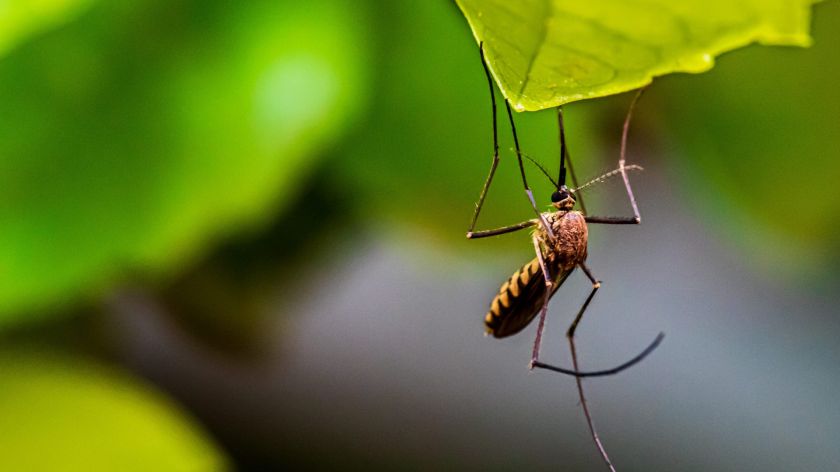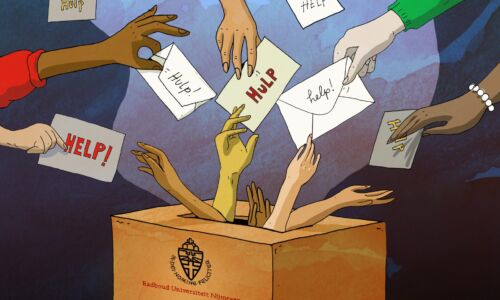What makes mosquitos go wild? Scientists try to find out at Lowlands
-
 Foto: Syed Ali (via Unsplash)
Foto: Syed Ali (via Unsplash)
What makes one person more attractive to mosquitos than another? That is what scientists from Nijmegen are going to research at Lowlands. And no, the participants do not actually have to be bitten by the small insects.
It is a recurring conundrum in relationships: why does one always get bitten by mosquitos and the other one doesn’t? Does one of them have sweet blood or something like that?
‘That is a myth,’ says mosquito expert Felix Hol. ‘We suspect the preference of mosquitos has more to do with the smell of your sweat than the taste of your blood.’
Thousands of mosquitos
You might assume that scientists already know the answer to the age-old mosquito question, but that is not the case. That is why researchers, including biophysicist Hol, will be travelling to the Lowlands-festival in Biddinghuizen in August with thousands of live mosquitos, to test which people are and which people aren’t attractive to the skeeters.
‘We will observe which people the mosquitos are preparing to bite’
The mosquitos will be in small cages and thus will not be released on the festival’s terrain (as some people on Twitter frantically assumed, but more on that later). So, they will not actually bite anyone. Hol: ‘We designed the cages ourselves. Participants can put their arm next to a kind of net where the mosquitoes cannot go through. Mosquitos smell people. We will observe if they sit on the edge of the net if the arm is nearby, and which people the mosquitos are preparing to bite.’
The actions of the mosquitos will be registered by cameras. At the same time, the researchers will have their participants fill in a survey. Did they wash themselves recently? Did they use soap or not? What did they eat? Did they use drugs or alcohol? And did they have sex?
‘We will also take a quick brush of the skin with a Q-tip to see which particles someone has on their skin. From those we’ll determine which bacteria mosquitos are and aren’t attracted to.’
Festival research
This will be the seventh year in a row where scientists will do research on Lowlands. The advantage of doing that at a festival is that you will immediately have access to a big group of participants. Hol also does research on mosquitos in the lab in Nijmegen. ‘We offer mosquitos controlled particles that are very often found in sweat,’ he says. ‘And we observe what makes them go wild.’ Scientists will be able to draw more conclusions from the loads of data that will hopefully be brought back from Biddinghuizen.
‘The animals we use are not genetically modified’
Radboudumc’s announcement about the mosquito research led to a lot of reactions on social media last weekend. A variety of commenters were convinced that these were genetically modified mosquitos that would be frantically released upon the crowds. Bill Gates would be behind it all, possibly with a secret mission. It was quickly linked to a possible new (planned) pandemic.
Researcher Felix Hol did not see the commotion coming but does want to debunk the suspicions. ‘The mosquitos will stay in their cages throughout the entire duration of the research. The animals we use are not genetically modified – none of our mosquitos are. We work with regular mosquitos.’
Malaria, zika, and dengue
Incidentally, the mosquitos that will be used for the Lowlands-research will be tropical, not Dutch. That is because mosquitos that spread malaria, zika and dengue are usually of the tropical kind. The research is aimed at finding out who is susceptible to a mosquito bite, so people can better protect themselves against it. ‘If we know what triggers mosquitos, we can prepare for it, for example by developing a better insect repellent,’ says Hol.
He hopes that at least three hundred participants want to partake in the experiment on Lowlands. There will be a scoreboard that keeps track which participant was the most attractive to the mosquitos. Afterwards, the mosquitos will go back home to Nijmegen.
Translated by Milou Aluy-van der Meij



